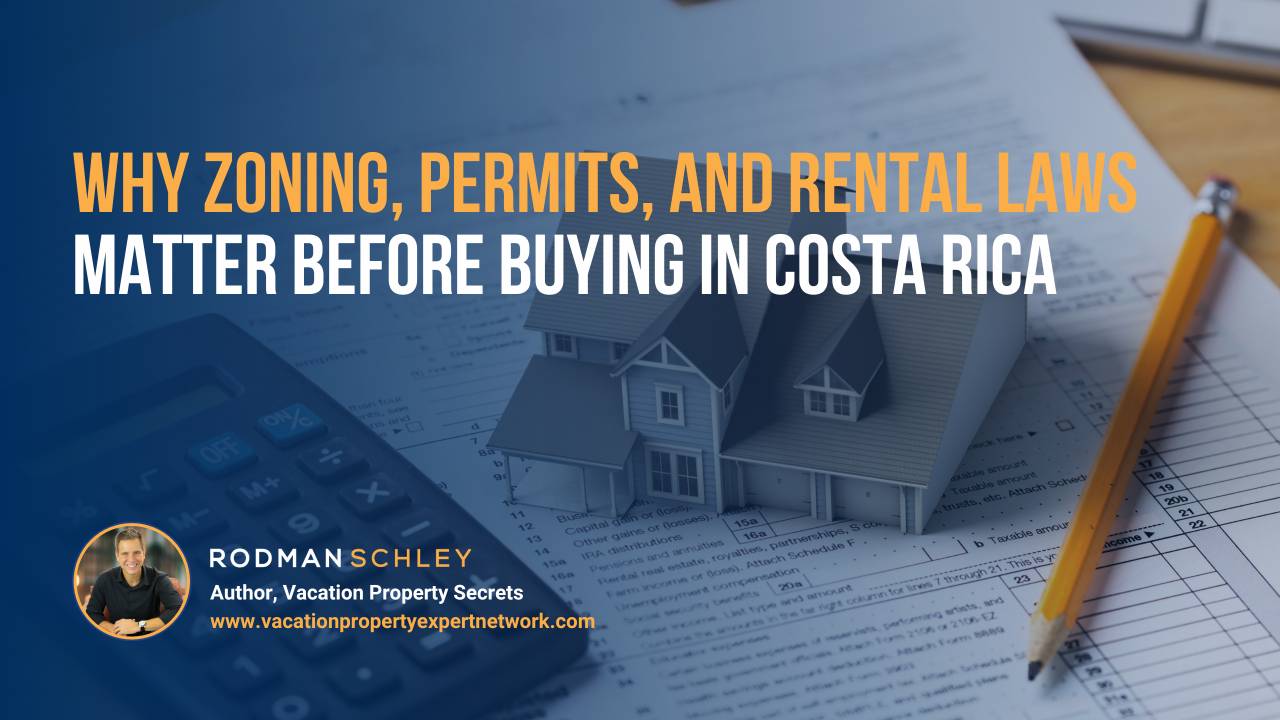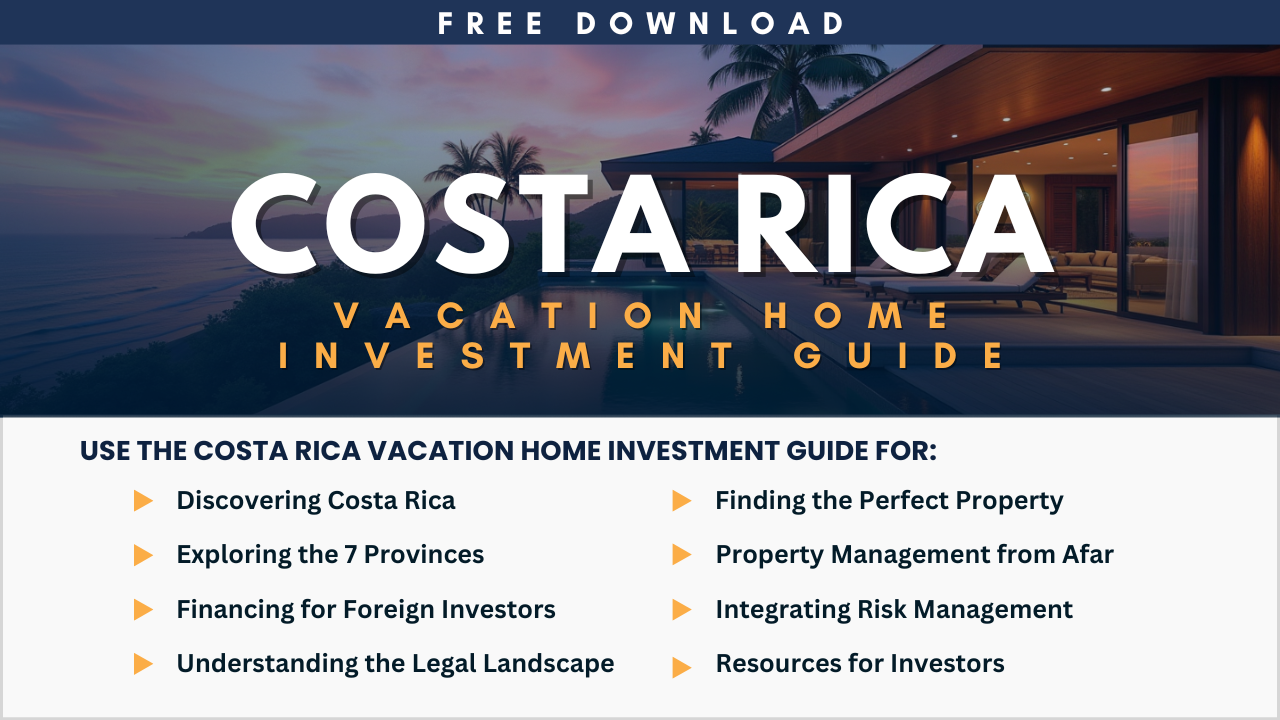
Why Zoning, Permits, and Rental Laws Matter Before Buying in Costa Rica
Costa Rica has long been a popular destination for international investors, particularly those looking to buy vacation homes, retirement properties, or income-generating rental units. The country’s natural beauty, rich biodiversity, and stable political climate make it an attractive option for people seeking a tropical paradise to call home or an investment opportunity. However, while the allure of Costa Rica’s beaches, forests, and vibrant culture is undeniable, there are important factors to consider before making a property purchase.
Among the most critical considerations are the zoning laws, permits, and rental regulations that govern property ownership and development in Costa Rica. These legal frameworks dictate everything from where and how you can build, what you can do with your property, and how you can rent it out—whether on a short-term or long-term basis. Understanding these laws is not only essential for complying with local regulations but also vital for ensuring that your investment is legally sound, profitable, and sustainable in the long term.
Many first-time investors may not realize how zoning restrictions, permit requirements, and rental regulations can significantly impact the viability of their plans. Ignoring these critical elements can lead to costly mistakes, legal troubles, and ultimately, reduced returns on investment. As a foreign buyer, it’s important to approach your Costa Rican real estate investment with a full understanding of the legal landscape, ensuring that your dream property is both financially and legally secure.
In this article, we will explore the key aspects of Costa Rica’s zoning laws, permits, and rental regulations, explaining why they matter for investors. With detailed examples and factual information, we’ll help you understand the rules and processes you need to be aware of to make a successful and legally compliant investment in Costa Rica’s thriving property market.
Understanding Zoning Laws in Costa Rica
Costa Rica's zoning laws are essential for anyone considering property investment or development in the country. These regulations dictate how land can be used, ensuring that development aligns with environmental conservation, community planning, and sustainable growth objectives. Failure to adhere to these requirements can result in significant delays, financial penalties, or even the dismantling of unauthorized structures.
- How Zoning Affects Property Development: Zoning laws in Costa Rica often determine what you can and can’t do with your property. Different zones may have different restrictions, such as whether the property can be used for residential, commercial, agricultural, or tourist purposes. For example:
- Residential Zones: These areas are typically designated for single-family homes, multi-family units, and residential complexes. If you plan to build a vacation rental or a large residential development, it’s crucial to confirm that the land is zoned for residential use.
- Commercial Zones: These zones are designed for businesses, restaurants, retail shops, and hotels. If you’re planning to set up a commercial property or a hotel in Costa Rica, you need to check the zoning to ensure that your property is in a commercial zone.
- Protected Zones: In Costa Rica, there are many protected areas where construction is strictly regulated or prohibited, especially near national parks, coastlines, or rivers. Building in these zones can result in severe penalties, including fines or the demolition of the property.
- Real-life example: An investor in Manuel Antonio, Costa Rica, bought property thinking it was in a prime area for vacation rentals. After purchasing, they discovered that the land was in a protected zone near a national park, making it illegal to build anything other than a small, eco-friendly structure. The investor faced difficulties in obtaining permits and was forced to reevaluate their investment strategy.
- Key Takeaway: Always check the zoning of any property you’re considering buying in Costa Rica to ensure it aligns with your intended use. A property in the wrong zone could lead to unexpected legal challenges, delays, and lost money.
- Residential Zones: These areas are typically designated for single-family homes, multi-family units, and residential complexes. If you plan to build a vacation rental or a large residential development, it’s crucial to confirm that the land is zoned for residential use.
Navigating Costa Rica’s Permitting System
In Costa Rica, just like in many countries, permits are required for various activities, including construction, renovations, or making significant changes to a property. Without the proper permits, you could be fined, forced to halt your project, or even face the possibility of having your work undone.
Types of Permits You’ll Need
- Construction Permits: These permits are required for any new construction or significant modifications to an existing structure. The permitting process involves submitting plans to local authorities for review. These plans must comply with local building codes, zoning laws, and environmental regulations. For example, if you plan to build a vacation rental on a piece of land, you’ll need to submit your blueprints to the municipality for approval.
- The cost of obtaining a construction permit in Costa Rica can range from 0.5% to 2% of the total construction value, depending on the region and the scope of the project.
- Environmental Permits: Costa Rica is highly protective of its environment, and many properties, particularly those near coastlines, rivers, or in forested areas, require environmental permits. You’ll need to demonstrate that your construction won’t harm the local ecosystem or violate environmental laws. For example, if your property is located near a sensitive area, like a river or beach, you may need to get an Environmental Impact Study (EIA) before proceeding with your plans.
- Real-life example: An investor in Guanacaste purchased a piece of land to build a luxury resort. They assumed they could start construction immediately, but after submitting their plans to the municipality, they were informed that they needed to conduct an Environmental Impact Study due to the land’s proximity to a protected mangrove area. The delay added significant costs and months to their project timeline.
- Permitting Process and Timeline: The average time to obtain a construction permit in Costa Rica is around 3-6 months. This can be longer in areas where the local municipality requires additional studies or where permits need to pass through multiple governmental bodies, especially when the property is in a protected zone.
- Key Takeaway: The permitting process in Costa Rica can be lengthy and expensive. Ensure you factor in time and costs for obtaining the necessary permits before embarking on your investment.
Understanding Rental Laws in Costa Rica
Costa Rica has emerged as a premier destination for real estate investment, attracting both short-term vacationers and long-term residents. With its rich biodiversity, stable political climate, and welcoming culture, it's no surprise that the country has seen a surge in property rentals. However, navigating Costa Rica's rental landscape requires a clear understanding of the legal frameworks governing both short-term and long-term rentals.
Rental laws in Costa Rica are designed to protect both property owners and tenants, ensuring fair practices and transparent transactions. For short-term rentals, platforms like Airbnb and Vrbo have become popular avenues for property owners to capitalize on the influx of international tourists. These platforms offer a convenient way to generate income but come with specific tax obligations and regulatory requirements. Conversely, long-term rentals, often exceeding 30 days, involve more intricate legal considerations, including tenant rights and lease agreements.
Understanding these laws is crucial for anyone looking to invest in Costa Rican real estate. Non-compliance can lead to fines, legal disputes, or even the loss of rental income. This section delves into the specifics of Costa Rica's rental laws, providing insights into the regulations that govern rental properties and offering guidance on how to navigate them effectively.
Costa Rica's zoning laws are essential for anyone considering property investment or development in the country. These regulations dictate how land can be used, ensuring that development aligns with environmental conservation, community planning, and sustainable growth objectives. Failure to adhere to these requirements can result in significant delays, financial penalties, or even the dismantling of unauthorized structures.
In Costa Rica, short-term rentals (less than 30 days) are subject to specific regulations, which may vary depending on the location. For instance, some areas require a tourism license for vacation rental properties, and you may also need to register with the National Tourism Board (ICT). Additionally, you’ll need to comply with certain tax requirements, including collecting and remitting the Tourism Tax. Short-term rental properties in Costa Rica are required to pay a 13% sales tax on rental income, as well as a 3.5% tourism tax.
- Example: If you rent out a property for $2,000 per month, you would need to remit $270 in taxes—$260 in sales tax and $70 in tourism tax—each month, reducing your potential profit.
Long-Term Rental Laws
Long-term rentals (over 30 days) are less regulated than short-term rentals, but there are still important laws to be aware of, particularly when it comes to tenant rights. Costa Rican law provides substantial protection for tenants, and it’s important to ensure your lease agreement complies with local laws. For example, if a tenant has been renting your property for an extended period, they may be entitled to certain protections against eviction.
Conclusion
Purchasing property in Costa Rica can be a lucrative investment, but it’s essential to understand the local rules and regulations surrounding zoning, permits, and rental laws. Each of these factors plays a crucial role in determining the viability of your investment, the potential returns, and the legal risks involved.
Before buying property, always check the zoning laws to ensure your intended use is allowed. Make sure you have the proper permits for any construction or renovations, and be sure to understand the rental laws that apply to your property, whether you plan to rent it out for short-term or long-term stays. By doing thorough due diligence and seeking professional guidance, you can protect yourself from costly mistakes and enjoy the full benefits of your Costa Rican investment.
For more information on navigating the complexities of property ownership in Costa Rica, it’s highly recommended to work with local real estate experts, lawyers, and tax advisors who can guide you through the legal requirements and ensure you’re in compliance with local regulations.
Investing in Costa Rica is a fantastic opportunity, but understanding the country’s zoning, permits, and rental laws is crucial to your long-term success.
👉 Get in touch with us today to explore available properties and ensure a smooth investment process in Costa Rica, visit vacationpropertyexpertnetwork.com.







